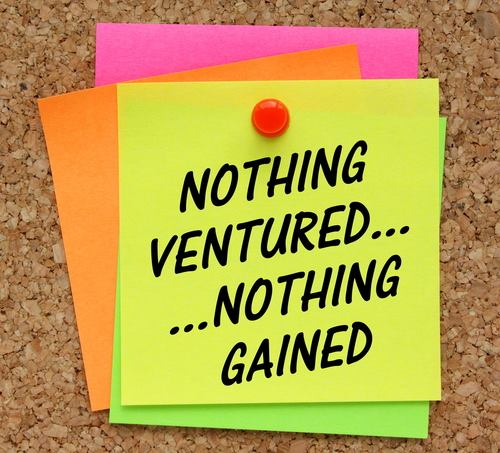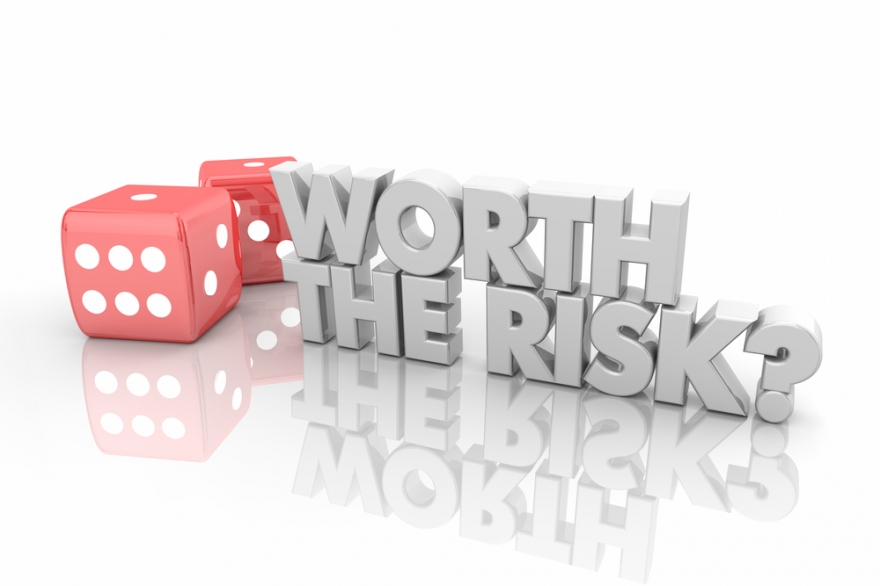Is Taking a Calculated Risk the Same Thing as Gambling?
Rev. Dr. Kitty Boitnott, NBCT, RScP
Heart-Centered Career Transition & Job Search Coach | Possibility Thinker
When gamblers head to Las Vegas, they sometimes use the odds that casinos publish to make better bets. But are the odds that casinos release accurate? Even if they are, do most gamblers pay any attention to them? It’s possible that some do, but I suspect that in most cases, players are shooting blind. They are there for fun. Some more "professional" gamblers are there to profit. It is true, however, that the odds always favor the house. Over time, on average, most wins turn to losses.
Gamblers are risk takers who are willing to play the odds and try to win against the casino. Some people have a natural inclination to take big risks. Many of us, though, don't have that inclination. We like to play it "safe."
The truth is, however, that we take risks every day.
My dad used to say that you can stub your toe and hurt yourself just getting out of bed in the morning. He was someone who assessed risk vs. rewards and perhaps took more chances that he should. When he was young, he was known to be a little of a daredevil on his motorcycle, for example. He was fearless in a lot of ways because he believed that taking some chances would provide specific rewards.
On the other hand, he played it safe when it came to taking care of his family. He didn't take chances with our safety.
We have all taken assessments that measure our comfort with or aversion to risk. Financial planners use these type of evaluations on a regular basis. They want to determine the kind of investments to recommend. If you are comfortable with taking more risks, they may place you in a fund that has a higher risk but higher reward ratio. If you are uncomfortable with risk, they will recommend "safer," more reliable investments.
When you are making any significant change in your life, you need to assess the risks vs. the rewards.
When you decide to get married, for example, you should consider the pros and cons of such a significant decision. When caught up in the throes of young love, you don't think about that as much, I suspect. But if you marry later in life, you may think about many other things besides love. It's a good idea to weigh the pros and cons of merging two well-established households. You might think about the lessons learned from the past. And you will ponder the rewards versus the risks of this decision on the rest of your life and those around you as well.
The same is true when changing jobs or choosing a new career.
When you are young and selecting your first career, you usually choose based on what you think we might like. You may pick based on the recommendation of someone you trust. Or you may decide to follow in the footsteps of a parent or relative. The thing is when you are young, you haven't enough experience yet to know for sure what you would enjoy or what you would be good at in your work.
As you get older, it may become necessary to make a change. Perhaps you decide that your first choice was a mistake. Some jobs become obsolete, and you have no choice. You have to make a change. When changing career paths, you need to think about the pros and cons of the new path you may want.
It is also true that most people who have been successful take risks. But they take calculated risks.
A calculated risk is the result of the analysis you do. You weigh the pros and cons of the change and decide if the pros outweigh the cons. The fact is, though, that there are no guarantees. Any change you make will carry some risk with it. The question you must consider is if the potential reward is worth taking the perceived risk.
There are benefits to playing it safe and going with the tried and true. And while I know that a lot of people are afraid to take certain risks, some people thrive on it.
Think of those who choose to climb Mount Everest, for example. The risks are many. People die making the effort. In fact, at least 375 people have perished attempting it. Bodies are often left there either at their own wishes or because trying to remove the body would cause too much risk for the rescuers.
In spite of the genuine danger involved, people continue to climb the mountain every year at increasing numbers. They are real risk takers. But they also plan meticulously for success. The calculation is that if they succeed, they will belong to the elite number of people who have been successful.
View of Mount Everest peak taken by Martin Jernberg
Mountain climbers are just one example of extreme risk takers. A more everyday type of risk taker that we take for granted would be our neighborhood firefighters. Talk about risk takers! Those guys run into burning houses while the rest of us run out of them.
Life is full of risks when you think about it.
Just driving to work on any given day is rife with risk. You trust that road conditions are going to be safe for you to travel, and you trust your fellow travelers, too. We all drive every day in spite of the fact that last year, 40,200 people died in automobile accidents. The people who died took the same risk, and it didn't work out for them. But that statistic won't keep you from driving to work tomorrow, will it?
We take the same calculated risk when we decide to fly somewhere. Last year nobody died in a commercial flight. But when we step aboard an airplane, we know that we are taking a risk, right? We trust that the airline has taken every precaution. We trust that the pilot is experienced and know what he or she is doing. But beyond that, we weigh the pros of being somewhere in a few hours versus staying home or driving for hours or days to get somewhere. And based on the odds, it is far safer to fly than to drive!
If you are risk-averse, you may want to consider taking more calculated chances.
You know the saying: "Nothing ventured...nothing gained."

If you are unhappy in a situation, whether it is personal or work-related, you may be afraid to make a change. Some people stay with jobs they hate because it is at least the "devil they know." The unknown is scarier than the situation they have at hand. But I would urge you to consider the pros and cons of being miserable where you are versus the chance of being happier somewhere else.
The best way to determine that, of course, is to study the situation in its entirety.

Before making a BIG change, think about what you can do that might make the situation better? Can you try couples counseling if the problem is with your relationship? Could you talk to your boss about a workload that is too burdensome at your job? Could you speak to a co-worker who has gotten on your last nerve and is causing you discomfort in the office? (Or could you manage to ignore that co-worker altogether?)
If the situation is beyond fixing, it may be time to consider your other alternatives. But you don't have to make any change without first considering all your options. You should look at as many options as you can. Weigh all the pros and cons. And know that even if you have to make an interim change to get to the outcome you want, that's okay. Life is not about certainty. If it were, think how bored we would all be. Sometimes taking chances is the right thing to do.
So, what is your level of comfort with or aversion to risk?
Have you thought about it? Is your discomfort with risk holding you back from living the life you want? If so, consider what your other options might be. You don't have to be a gambler to take a chance on something you want. In answer to the question posed in the title, I don't believe that taking a calculated risk is the same as gambling. But even if it were, gambling on your happiness may be a gamble worth taking, don't you think?
In case you are interested in examining your options and weighing the pros and cons of making a change, I have two programs for you to take advantage of if you would like.
The first is a replay of the Master Class I did in June. See the information below. The second is an upcoming program that I am planning for July 28th. See the information for that further down.
Let me know if you have any questions. If you need help assessing the risk vs. the reward of making a change in your own life, maybe I can help.
And if you are interested in how to identify your true purpose and passion in life, join me for another brand new Master Class.
It is scheduled for Saturday, July 28th at 11:00 AM EST.

|